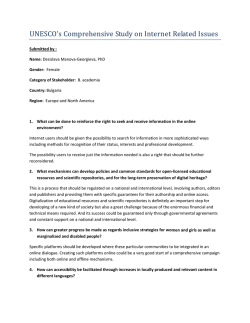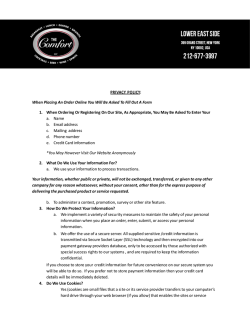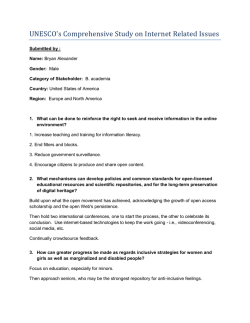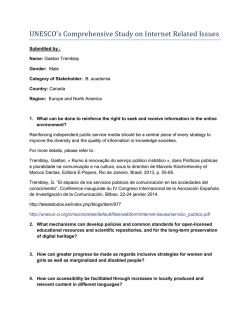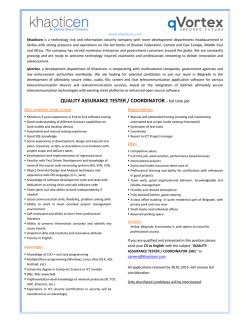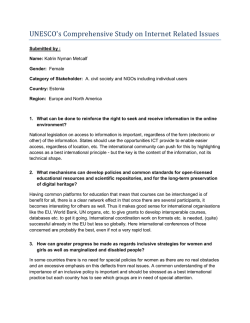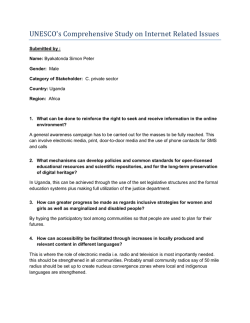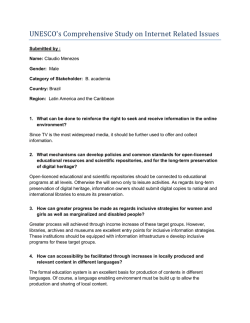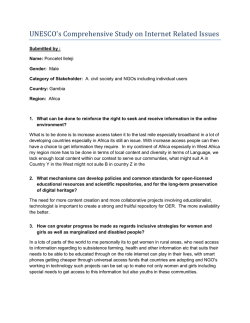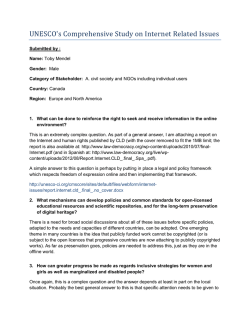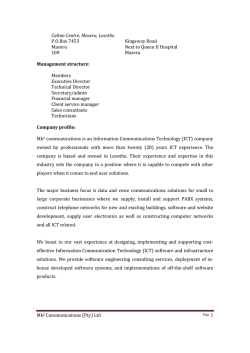
Questions and Answers Related to the field of privacy (Nov
Questions and Answers Related to the field of privacy (Nov.2014). 1. What can be done to reinforce the right to seek and receive information in the online environment? Enforcing The Right To Access Information Act in the online environment would be an ideal way to reinforce the right to seek and receive information in the online environment. 2. What mechanisms can develop policies and common standards for open-licensed educational resources and scientific repositories, and for the long-term preservation of digital heritage? Passing the Right to Access Information and enforcing the Communications Act would be the first mechanism and this would then be used to pass many other policies and standards for open-licensed educational resources and scientific repositories for the preservation of digital heritage. 3. How can greater progress be made as regards inclusive strategies for women and girls as well marginalized and disabled people? Developing an all inclusive Access to Information and Knowledge Strategy that emphasizes strategies towards women, girls and marginalized and disabled people would be great progress made in that direction. 4. How can accessibility be facilitated through increases in locally produced and relevant content in different languages? Promoting the development of local produced and content in different languages by offering incentives for such activities. 5. What can be done to institutionalize MIL effectively in national educational systems? 6. What are the current and emerging challenges relevant to freedom of expression online? The major challenges relevant to freedom of expression online is how to the translation the Freedom of Expression to online activities because though the this Law covered a wide scope, it did not take into account more about online activities. 7. How can legislation in a diverse range of fields which impact on the Internet respect freedom of expression in line with international standards? All laws from diverse range of fields should be developed and/or updated based on international standards ensure prober enforcement of Cyber Laws. 8. Is there a need for specific protections for freedom of expression for the internet? Yes there is need for specific protections for Freedom of expression for the internet. 9. To what extent do laws protect digitally interfaced journalism and journalistic sources? The laws protect digitally interfaced journalism and journalistic sources to a lesser extent. 10. What are the optimum ways to deal with online hate speech? How can Media and Information Literacy empower users to understand and exercise freedom of expression on the Internet? Optimum ways to deal with online hate speech includes: Digital literacy — teaching citizens respectful online behavior — is the key to those education efforts; Establishing clear hate speech policies in their Terms of Service and mechanisms for enforcing them; Making it easier for users to flag hate speech and to speak out against it; Facilitating industry-wide education and best practices via multi-stakeholder approaches; and Limiting anonymity and moving to “realname” policies to identify speakers. In present day, more and more users use the internet to view and extract information and more institution use the internet to communicate to the world and while the introduction of handheld devices such as phones, tablets etc, greater percentage of people send more time online reading different articles. Against that backdrop, the internet would be an ideal place for Media and Information Literacy empowerment. 11. What are the optimum systems for independent self-regulation by journalistic actors and intermediaries in cyberspace? Setting up of an independent media commission with the agency responsible for cybercrime to self-regulate and enforce the Right To Access Information Act in the cyberspace. 12: What Principles should ensure respect for the right to privacy? Privacy in broad perspective is believed to be the ability of individuals, community, State and country to be left alone to manned its own affairs without unethical intervention. Referencing the above therefore led nations around the globe to outline and implement measures to safe guard the privacy of individuals to boost confidence in the information society. The principles therefore are; -Respect to the country‘s Telecommunications laws/ACT. -Respect to the individual‘s right to the security of information and -Respect to the basic concept of expression. 13: What is the relationship between privacy, anonymity and encryption? -The relationship between privacy, anonymity and encryption are cordial and that the correlation between attaining to real privacy is achieved through the use of ICT tools like the data encryption tools . 14: The importance of transparency around limitations of privacy revolves around the ethics of democracy and the fundamental rights of ICT end users of service and deliveries. 15: The arrangements lies on different data protection acts/cyber security laws that outlines clear distinction on users and administrative functions. 16: The reconciliation between openness and transparency of data could be done through a collaborative approach by ICT stakeholders and end users to abide to basic ICT education and awareness programs relating to its use and misuse. 17:The biggest impact and or real concern to issues of big data is security ;cyber espionage and its related activities is on the rise and left with researchers to outline the mechanisms directed towards information safety 18: Security of individuals personal Data could effectively be enhanced through real concerted efforts by ICT stakeholders and users to abide to the basic principle of information and communications security and this could be done through: -ICT education and Awareness The use of ICT encryption tools Hardware tools (IPS/IDS. 19: To integrate ICT education in the formal school curriculum from primary to tertiary levels and enhances the ICT awareness campaign programs in both the print and the electronic media. Questions Related to the field of ethics. 20;This could be done through bilateral and multi-lateral engagement between nations to respect the fundamental value of democracy and the rule of laws. 21: The conceptual frameworks could be a research directed to information and knowledge sharing targeting ICT end users. 22: Researchers have done a lot to improve security on gender related issues leveraging the use of internet; and more especially laws/Acts and that has been passed by nations to safeguard women and children. Also are encryption tools to mitigate cyber threats to maximize satisfaction to users 23:This could be done through a comprehensive approach to develop and enact ICT policies/Laws to regulate the effective use of the internet. E. Broader Issues 24 Right to Access Information Act (National), ECOWAS supplementary Act on data protection, ECOWAS supplementary Act on the harmonisation for the Policies and Regulatory Framework on ICTs 25 The regional body ECOWAS to which Sierra Leone is a signature, is working frantically hard for the harmonisation of legislatures bordering on key areas of interest. When cross-jurisdictional concerns arise which have not been addressed by existing instruments, then the issue will be tabled for discussions and where necessary appropriate legislations deemed are drafted and adopted by member states. Responsible institutions concerned with such matters are the Commission, the Community Parliament and the Community Court of Justice. 26 For Sierra Leone, the current Telecommunications Law is under review with a proposed nomenclature electronic communications act. When adopted by parliament, the act and the Right to Access Information act and the criminal libel laws shall be the main legal instruments relating to the research focus areas. For example, The Right to Access Information Act gives the right to access non-classified information for eventual public consumption but in an ethical manner by respecting institutional and individual privacy in a nonmalicious way. 27 None F. Questions Related to other options
© Copyright 2026
